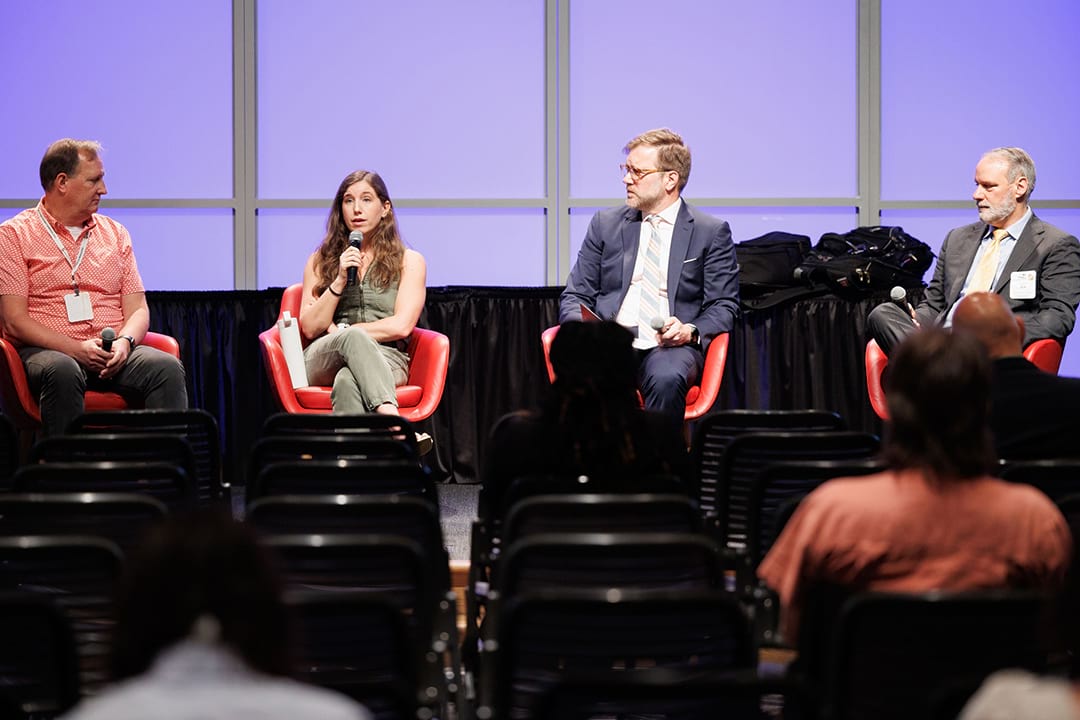Georgia Tech sustainability experts representing diverse fields contributed research and insights at the Georgia Climate Conference. The gathering was held May 15-17, 2023, at the University of Georgia. It was organized by the Georgia Climate Project (GCP), which is building a network of experts from across the state to advance four strategic priorities: science, stronger conversations, solutions, and a stronger network. Georgia Tech is one of the GCP’s 14 partnering colleges and universities in the state. The conference featured an entire day of Drawdown Georgia research and activities, including industry representatives from the Drawdown Georgia Business Compact, which is facilitated by the Ray C. Anderson Center for Sustainable Business at the Georgia Tech Scheller College of Business.
In his welcome address, Jack Hu, senior vice president for academic affairs and provost at the University of Georgia, said that climate change is “one of the greatest challenges we as humankind are facing.” The conference focused on the theme of “minimizing Georgia’s risks and maximizing Georgia’s future.” Over 500 problem solvers from academia, industry, communities, and government came together to network and discuss challenges and solutions. More than 100 of the attendees were students. GCP Director Patricia Yager said, “They are the future, and we need to be listening to them.”
Read more to discover insights from members of the Georgia Tech community.
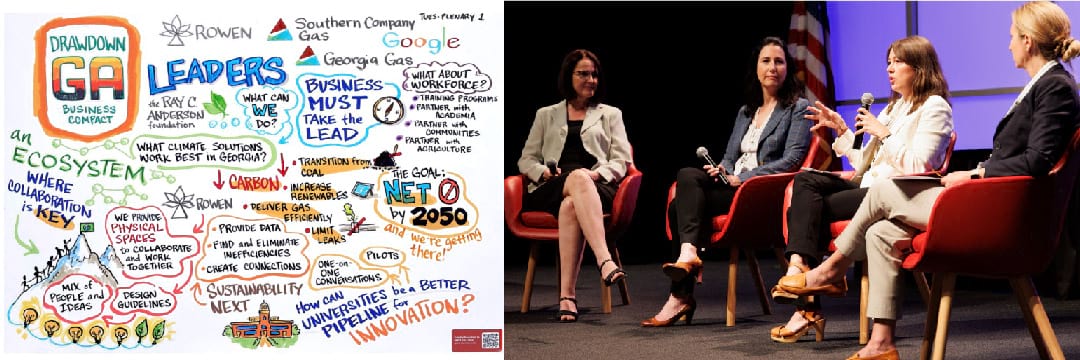
Drawdown Georgia Shows a Path Forward
Many presentations referred to Drawdown Georgia – a movement launched by the Ray C. Anderson Foundation to accelerate progress toward net zero greenhouse gas emissions in the state. Drawdown Georgia was inspired by Project Drawdown, which laid out the most impactful climate solutions for the planet. The multi-university research of Phase 1, led by Marilyn Brown (PI), Regents’ and Brook Byers Professor of Sustainable Systems in the School of Public Policy, explored the climate solutions that work best in Georgia. Twenty high-impact solutions were revealed in October 2020. Phase 2, focused on solution activation, is now underway.
Engaging Businesses
The Drawdown Georgia Business Compact (Compact) is among Drawdown Georgia Phase 2 initiatives focused on climate solution activation. The Ray C. Anderson Center for Sustainable Business (Center) launched the Compact in October 2021 to leverage the collective impact of the Georgia business community to achieve net zero carbon emissions in the state through a just, prosperous, and sustainable transition. In a plenary session, “Business Leadership in Climate Action,” Center Faculty Director Beril Toktay remarked, “Ray C. Anderson said that business is a big institution that can and must take the lead.” The Compact is now 57-members strong. Toktay said, “We’re proud that so many companies are committed to net zero in a way that lifts up public health, equity, and inclusion.”
Introducing lightning talks from Compact members, David Eady, the Center’s industry engagement director, said that Compact leadership was intentional about including diverse types of companies in regard to size, sector, and location in the state. The Compact is currently focused on building a community of practice and exploring collaborative initiatives – from greening the grid and building efficiency to regenerative agriculture and alternative fuels.
Compact members shared the work they are doing to reach the net zero target. Examples include Google’s work towards decarbonizing the grid, Cherry Street Energy’s commitment to making solar energy more accessible, Retaaza’s efforts to make local food more accessible and affordable, and RYAM’s focus on unlocking the full potential of sustainability harvested trees.
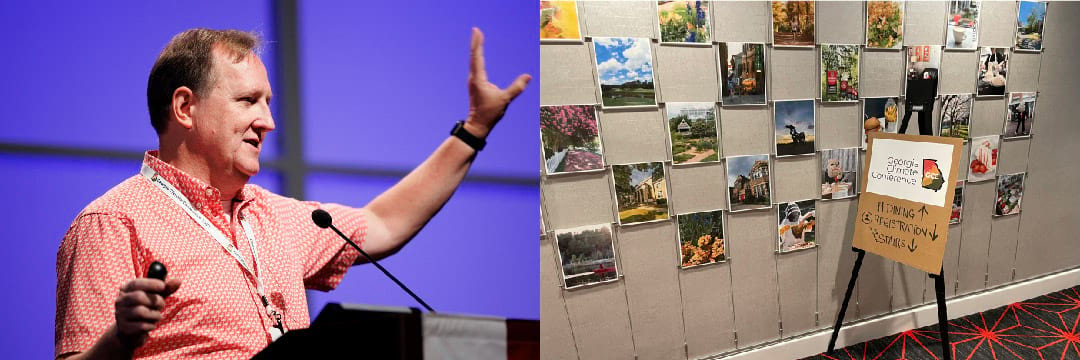
Higher Ed & Sustainability
Sustainability leaders from Georgia Tech, Spelman College, the University of Georgia, the University of North Georgia led a session on implementing Drawdown Georgia solutions on university campuses. Jennifer Chirico, Georgia Tech’s associate vice president of sustainability, shared the work coming out of the Office of Sustainability. She said, “Our mission is to serve as a collaborative partner working toward sustainable and equitable solutions for our Georgia Tech community.” Solutions include clean energy, resilient infrastructure, materials management, and stakeholder engagement.
The campus’ climate action plan aligns with the UN Sustainable Development Goals, the Georgia Tech Strategic Plan 2020-30, and Sustainability Next (a Strategic Plan implementation roadmap for sustainability at Georgia Tech over the next 10 years). Chirico said her team is committed to making Georgia Tech a “living learning campus,” which connects the built environment and landscape to research, partnerships, and real-world educational experiences.
Building for Resilience
The Kendeda Building for Innovative Sustainable Design at Georgia Tech has the distinction of being the first building in Georgia (and the 28th in the world) to be certified as a Living Building, which in short follows the ethos of nature by giving back more than it takes.
The Kendeda Building team used humor to tackle a serious topic. A multimedia presentation about a zombie attack on the building served as an allegory for climate change. Panelists included Building Director Shan Arora, Design Team Project Manager Joshua Gassman, and Project Manager for Construction Jimmy Mitchell (CE ’05). A Google Maps virtual tour gave attendees the experience of exploring the Kendeda Building and introduced them to features that could help humans survive zombies (or climate change impacts). Limited access to food, water, and energy? No problem. The Kendeda Building has net-positive energy, a rooftop garden, and a system to make rainwater potable. With proper planning, the panelists argued, buildings and infrastructure can help the state better withstand serious challenges to humankind.
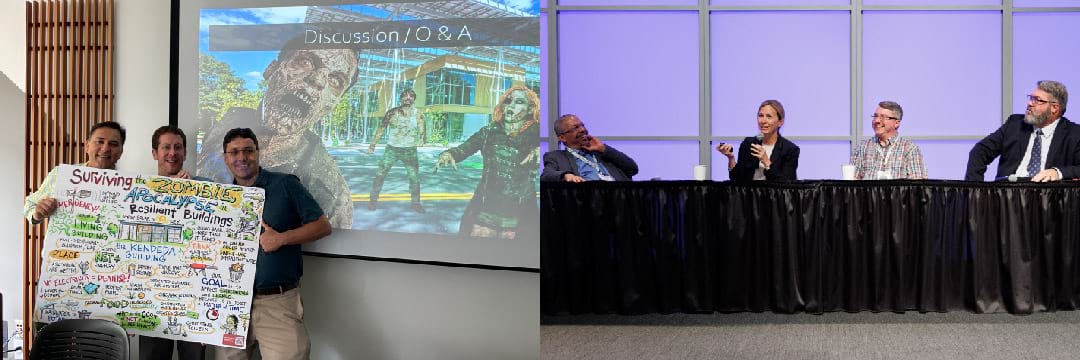
Prioritizing Equity and Inclusion
Drawdown Georgia, which set forth the roadmap of climate solutions for the state, did so with an eye on equity. Center Managing Director Michael Oxman led a plenary discussion, “Advancing Equity in Drawdown Georgia Solutions,” with Marilyn Brown, Sustainability Solutions Group and Institute President Garry Harris, and Executive Director of Georgia College & State University’s Rural Studies Institute Veronica Womack. Oxman said that a number of benefits, such as improved air quality and public health as well as job opportunities, are emerging as Drawdown solutions scale. However, he noted, Atlanta faces a number of well-documented, deep-seated inequities related to income inequality, energy burden, and systemic racism. Oxman asked, “How can we make this transition [to a future with net zero greenhouse gas emissions] one that benefits the most people and helps to address these inequities?” He shared the Equity Opportunities Report that offers a path forward to a healthier and more prosperous future for all. The panelists discussed how addressing rural disparities, developing training and workforce programs, and building trust in communities could help to move the state in a positive direction.
In another panel, Rebecca Watts Hull (PhD HSTS ’18), assistant director of faculty development for sustainability education initiatives at the Center for Teaching and Learning, and a co-editor of the Equity Opportunities Report, discussed community engagement and relationship building.
“It was wonderful to see that equity and community development were prioritized throughout the conference and that the other conference attendees gave these topics an overwhelmingly positive reception,” said Wyatt Williams, an equity researcher and graduate student in civil and environmental engineering. Williams also valued the opportunity to connect with community leaders who had driven projects at the local and regional levels related to topics such as affordable housing and equitable energy transition.
The conference’s thoughtful attention to equity also resonated with Felicia Lamothe (MBA ’23). She said she was moved by the words of Nathaniel Smith, founder and chief equity officer at the Partnership for Southern Equity: “You can’t claim to love this planet and not all the people in it.” Lamothe said, “The work that Smith and several other conference attendees, facilitators, and speakers are doing to empower historically underserved communities and ensure they’re not left behind or out of climate initiatives is nothing short of inspirational.” Dual-degree student Azell Francis (a first-year student in the Full-time MBA Program who is simultaneously pursuing her Ph.D. in International Affairs, Science and Technology) concurred: “To create the future we all want and deserve, we must include all voices, not just the ones that sound most like ours.”
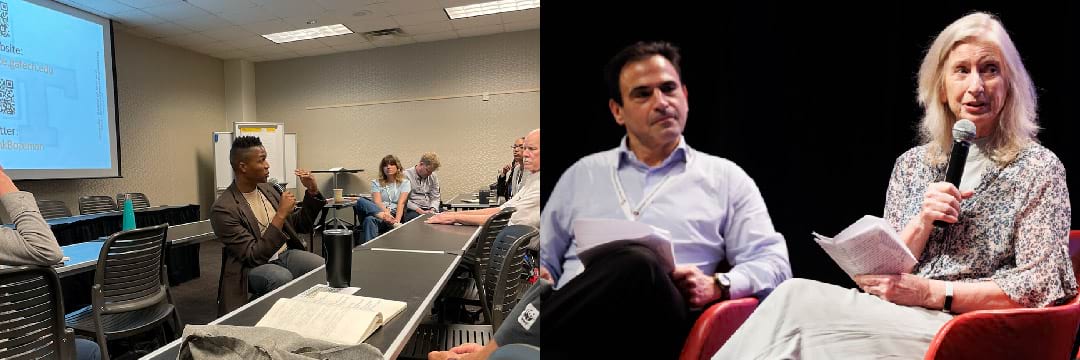
A Positive Note on Georgia Emissions
The same week as the conference, a study was released with analysis from the Georgia Emissions Tracker. Marilyn Brown discussed the study in a panel, “Shrinking Your Carbon Footprint.” She remarked, “The bottom line is really favorable.” Over the past five years, the net carbon footprint has seen a 5% total reduction – despite our economy growing by 10%. Brown said that the study proves to naysayers that you can have carbon reduction and economic development.
While this is overall good news, there is an uneven rate of progress across sectors. For instance, diesel emissions from medium and heavy-duty trucks, buses, and 18-wheelers have increased over 5%. Natural gas used by houses and industry has also seen an increase.
Looking forward, Brown said she is optimistic Georgia will meet Paris Climate Agreement goals for 2030 – but said we are not on track to meet the 2050 goal of zero net emissions. The three solutions with the greatest potential to reduce emissions are utility-scale solar, energy-efficient trucks, and energy-efficient cars. “We’ve done the easy stuff. We’re going to need to take bolder steps,” she said.
More Voices, More Climate Solutions
With over 50 panels, plenaries, and special activities over the course of three days, the conference offered attendees the chance to expand the breadth and depth of their knowledge of sustainability solutions. They learned how climate vulnerability assessments are created (in a panel featuring Jennifer Chirico and Jairo Garcia, lecturer in the School of City & Regional Planning). They discovered (in a talk by Joe Bozeman, assistant professor in the School of Civil and Environmental Engineering) the environmental and health benefits of going meatless – and how this lifestyle change is a gateway to other pro-climate choices. Attendees also heard about risks and opportunities related to the Okefenokee Swamp, the rising sea level, climate pedagogy, eco-grief, climate solutions journalism, electric vehicle infrastructure, and much more.
Habeeb Ilufoye, a first-year student in the Full-time MBA Program, reflected on the conference’s value in bringing together a multitude of voices. He said, “Everyone has a role to play in sustaining and preserving our world: individuals, groups, businesses, and government. Only when we are on the same page and actively working towards this goal do we stand a chance at undoing the damage that has been done.”
Written by Jennifer Holley Lux
